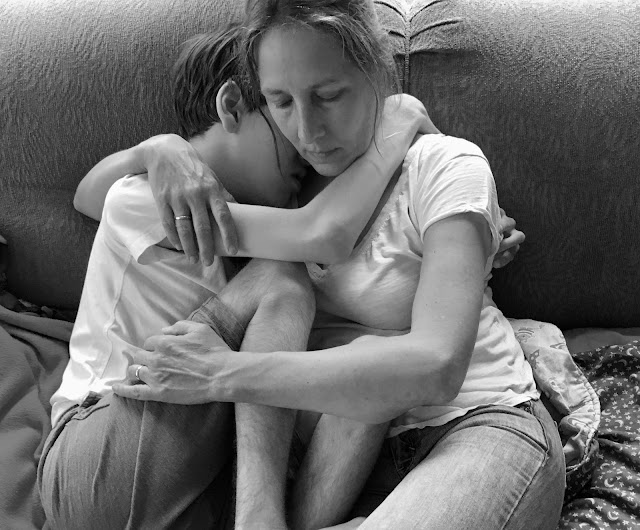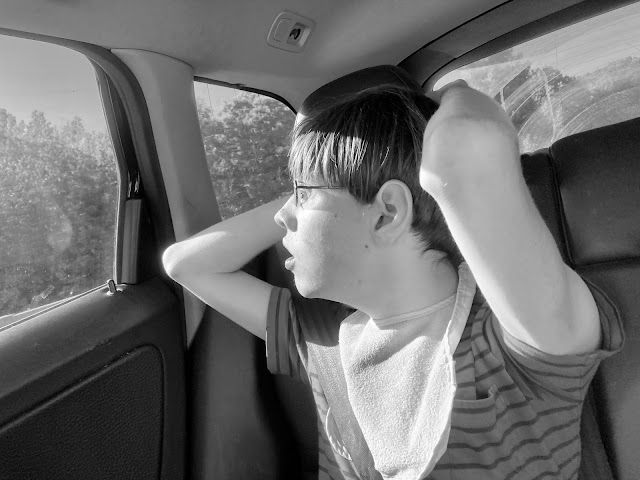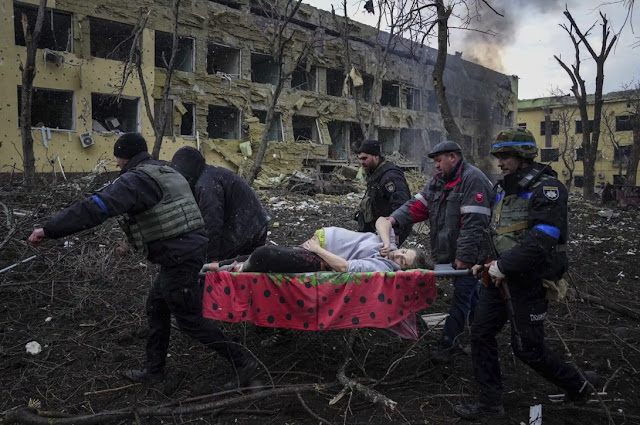I watch as a boy of five or six falls off of his bicycle. Somewhat remarkably, he lands squarely on his hands; his feet quickly follow. Having escaped injury, he rises and claps triumphantly, then begins to do a goofy, self-styled boogie, which is perfectly annoying to me. The caption on the video reads, "This should be your reaction when life challenges you."
For starters, I'm not a fan of the word, "should." I try not to "should" anyone, including myself. The rest of my cynical response to the video was—like most things—informed by my profoundly disabled, nonverbal, seizure-prone son. Calvin had just come off of a very shitty few weeks which began with back-to-back grand mal seizures, followed by waves of excruciating pain of unknown origin, the likes of which reminded me of Hollywood torture scenes. Ultimately, Calvin landed in the emergency room on New Year's Eve with an agonizing case of viral gastroenteritis and/or a problematic gallstone, which—after reviewing X-rays, a CT scan, and several blood draws taken at ungodly hours—the doctor said had likely caused the aspiration pneumonia in Calvin's left lung. We were released from the ER the following morning, and though I was relieved to be out of there, I didn't feel like dancing a jig; I felt only grateful that it seemed we may have dodged the latest bullet in Calvin's lifelong barrage of them.
Calvin reminds me daily that not everyone is equipped or inclined to celebrate or give ourselves high fives after life's nasty pitfalls, even if we eventually land on our feet. Sometimes, some of us come away from challenge and hardship feeling confusion, guilt, insecurity, anger, angst, resentment, exasperation, despair. My first reaction to the dancing boy was to acknowledge that not everyone is sailing along in life in the first place, or lucky enough to avoid misfortune such as hunger, war, poverty, displacement, abuse, injustice, depression, the death of a child, or one born to a life of profound physical and cognitive limitations and miseries, like Calvin. Call me a Debbie Downer for criticizing what some might consider a harmless, light-hearted video. I mean, I get the gist, and I'm generally an upbeat optimist who sometimes even welcomes challenge, however, I look at certain subjects through a more serious lens than others.
The video also reminded me of the countless times people have told me that everything happens for a reason. Though the sentiment is meant to be comforting, I generally respond by disagreeing, then go on to explain my preference for the notion of gleaning great purpose and meaning from life's hardships (a practice which can also be elusive to some) as opposed to there being some mysterious reason baked into every awful thing that happens. If I probe, some folks claim that bad things happen to teach us lessons. I usually respond by telling them I am not worthy of my son's suffering. Others say we can't know the reasons for mishaps and tragedies, but that God has a plan. I'm always left wondering: if there is an omnipotent god with a plan for everything, why does it so often include godawful misery, and how is that not deeply disturbing if not unthinkable? Would an all-powerful god orchestrate every little scrape and bruise I get and/or the immense suffering my son endures? Does God stage and sanction starvation, war, genocide? What kind of god has a reason—and what in God's name could that reason be—for the torture of "his" beloved children at the hands of others, or from excruciating illnesses? And if God isn't responsible for orchestrating horrors such as mass shootings, catastrophic fires, floods and earthquakes, then why doesn't "he" rescue us from suffering? Even we puny humans will do virtually anything in our power to save our children from pain. Why doesn't God? And if there is a reason for everything, what does that say about the notion of free will? Lastly, some people say God is testing us, and my immediate response is to ask: for what purpose? To what end? Is God conducting some test of fidelity, and if so, what deep conceit does that reveal? And what would be the point of testing us, knowing we are impossibly fallible beings?
I've found myself ruminating over the bicycle-boy video and related conversations for weeks, and I'm taken back to my childhood. Despite being raised Catholic, I began doubting the existence of a merciful, omnipotent god when my best friend's two-year-old sister nearly drowned in their nearby swimming pool. I had been outside when I heard the dog barking and the mother discover her baby girl lifeless in the water. I had never heard a grieving human shriek and howl so animalistically. She fished her daughter out of the pool and resuscitated her. The child survived, but was in a coma for at least a week and emerged from it no longer a toddler, having lost every one of her acquired skills. Her recovery, while not utterly complete, took years. I'm surprised her mother survived the ordeal, and I wondered if she felt as if God were punishing her for some petty transgression. It didn't make sense to me that a merciful god would allow any of "his" flock to suffer and grieve so deeply. It all seems so utterly senseless.
In continuing to ponder the theory that everything happens for a reason, I wondered if maybe that reason is merely that we exist. Perhaps it's as plain and simple as that: we exist, and therefore things happen to us. It seems reasonable that all things great and small, as in nature—rain, sunshine, hurricanes, earthquakes, moss growing on trees—just occur without any divine reason. In other words, as the saying goes, shit just happens. It makes sense to me—and frankly is far more comforting than the notion of a god with a secret plan sitting idly by while we are tormented—that our every move isn't governed, decided, judged and orchestrated by a god. And, too, maybe overcoming life's nasty challenges and curveballs isn't always reason for smug celebration, but rather, a time for reflection, gratitude and humility, especially considering so many of our fellow beings, through no fault of their own, live in a world of misery.
 |
| Photo by Michael Kolster, August 2021 |















